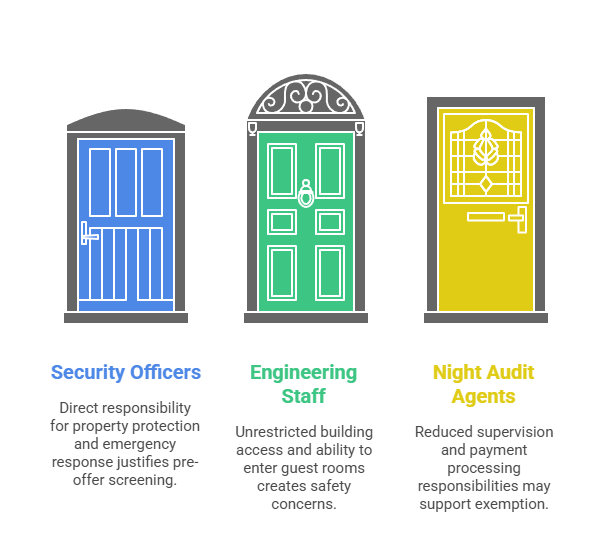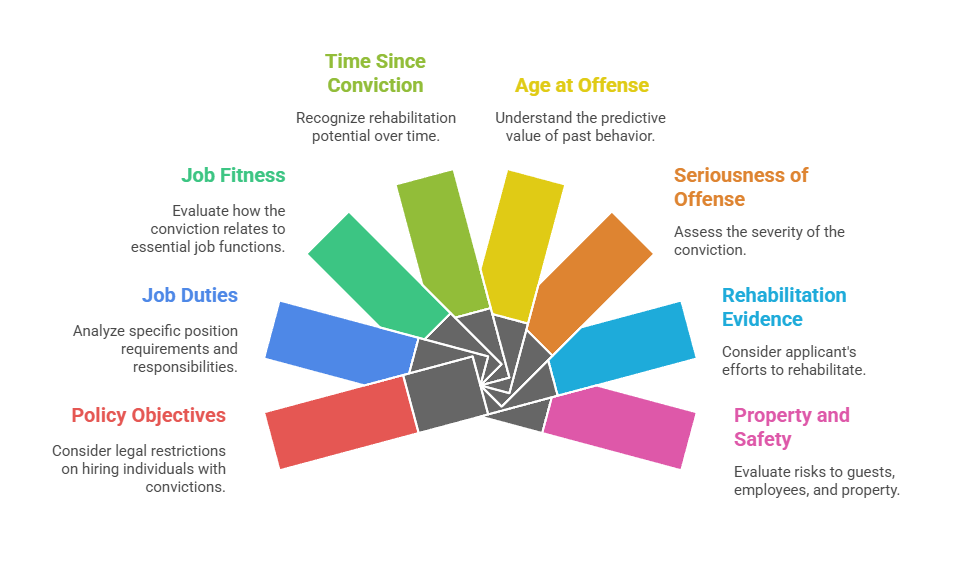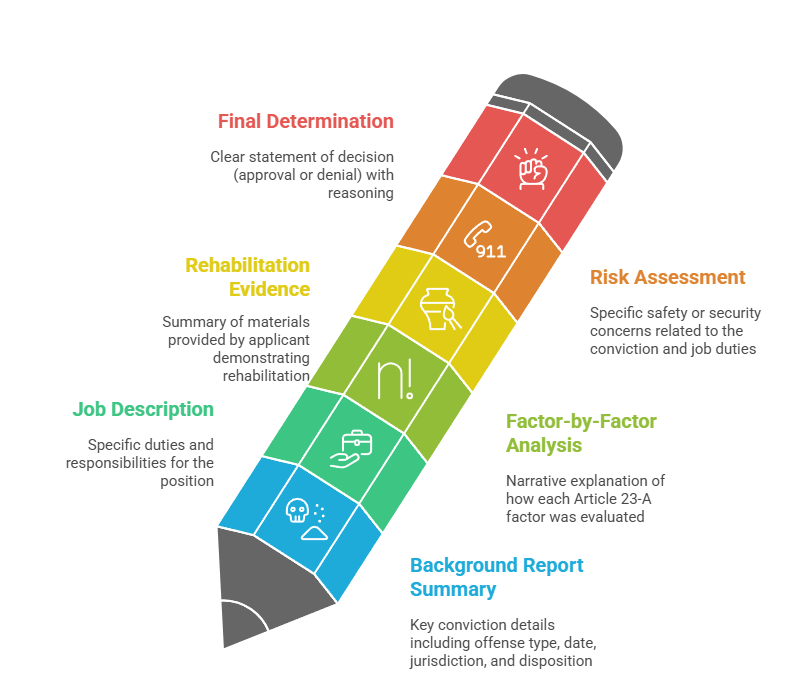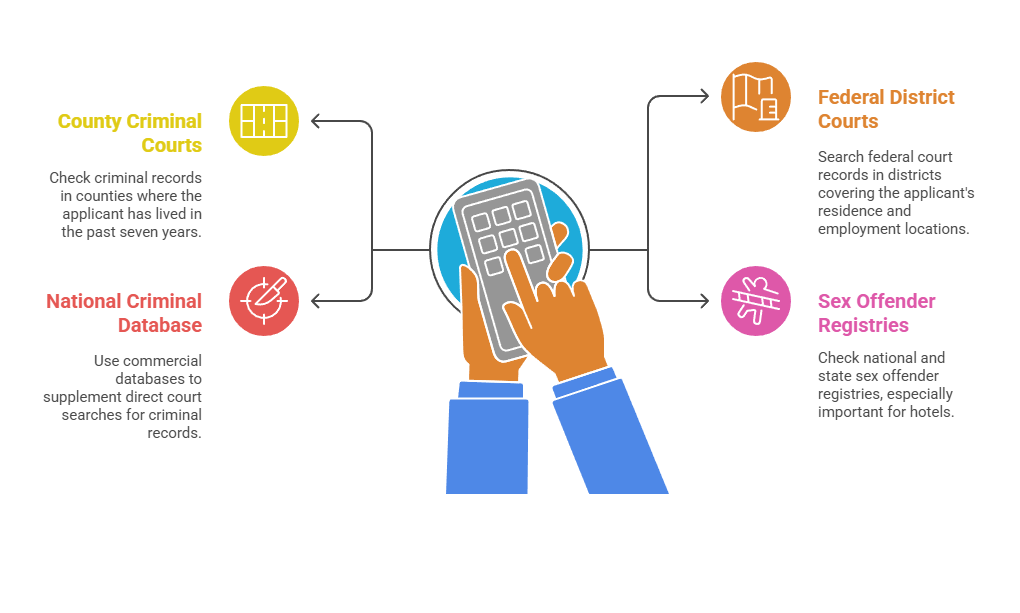New York hotel background checks require dual-layer compliance with both state Article 23-A fair chance provisions and NYC-specific Human Rights Law restrictions. This guide provides hotel operators across Manhattan luxury properties and upstate resorts with actionable frameworks to conduct legally compliant employee screenings while maintaining operational security standards in a $70+ billion tourism economy.
Key Takeaways
- New York state law requires employers to perform individualized assessments of criminal records under Article 23-A before denying employment based on conviction history.
- NYC hotels must comply with additional Fair Chance Act restrictions that delay background checks until after conditional job offers for most positions.
- The hospitality industry faces unique challenges due to high employee turnover rates (73% annually) and diverse workforce demographics requiring culturally sensitive screening processes.
- Hotels can conduct background checks on applicants for security-sensitive positions without waiting for conditional offers under specific NYC exemptions.
- Article 23-A requires employers to consider eight statutory factors including job responsibilities, time since conviction, and rehabilitation evidence before adverse employment decisions.
- Manhattan properties operating within the five boroughs face stricter timelines and documentation requirements than upstate New York resort employers.
- Non-compliance penalties include EEOC complaints, New York State Division of Human Rights investigations, and private lawsuits with uncapped damages.
- Partnering with FCRA-compliant background check providers specializing in New York's dual-jurisdiction framework reduces legal exposure by 67% according to hospitality industry compliance data.
Understanding New York's Dual-Jurisdiction Background Check Framework
New York hotel employee background checks operate under a two-tiered regulatory system. Hotel HR directors must simultaneously navigate New York State Correction Law Article 23-A and the New York City Human Rights Law Fair Chance Act. This dual compliance requirement creates particular complexity for hotel chains operating properties in both Manhattan and upstate resort markets like the Catskills, Finger Lakes, or Adirondack regions.
The regulatory distinction stems from New York City's authority to impose stricter employment regulations than state minimums. Article 23-A establishes baseline fair chance protections for applicants with criminal histories. Meanwhile, the NYC Fair Chance Act adds procedural layers including timing restrictions, enhanced notice requirements, and expanded documentation obligations. Consequently, hotels must identify which jurisdiction governs each property location and implement location-specific screening protocols.
New York State Article 23-A Requirements
Article 23-A prohibits employers from denying employment based solely on criminal conviction records without conducting individualized assessments. The law requires evaluation of eight statutory factors: policy objectives underlying licensing restrictions, specific duties and responsibilities of the position, bearing of criminal offense on job fitness, time elapsed since conviction, age at time of offense, seriousness of the offense, evidence of rehabilitation, and legitimate interest in protecting property and safety. Hotels cannot apply blanket conviction exclusion policies across job categories.
The individualized assessment must be documented in writing when employers make adverse decisions. Hotels should maintain assessment records showing how they weighed each statutory factor against job requirements. This documentation becomes critical evidence if applicants file discrimination complaints with the New York State Division of Human Rights.
NYC Fair Chance Act Additional Layers
The New York City Fair Chance Act imposes three additional compliance requirements beyond Article 23-A for hotels operating in Manhattan, Brooklyn, Queens, the Bronx, or Staten Island. First, employers must delay criminal background checks until after extending conditional job offers for most positions. Second, hotels must provide applicants with Fair Chance Act notices explaining their rights under city law. Third, employers face compressed timelines for completing Article 23-A assessments after reviewing background check results.
| Requirement | Timing | Documentation |
| Conditional Offer | Before background check | Written offer letter specifying conditions |
| Fair Chance Notice | With job application | NYC Commission template or equivalent |
| Article 23-A Assessment | Within 5 business days of intended adverse action | Eight-factor written analysis |
| Applicant Response Period | Minimum 5 business days | Documented delivery method |
| Final Decision Notice | Within 5 business days | Specific reasons and appeal rights |
The compressed timeline creates operational challenges for hotel recruiters managing high-volume hiring during peak tourism seasons. Spring and summer hiring surges require streamlined workflows that maintain compliance velocity. During these periods, recruiters process dozens of conditional offers simultaneously across front desk, housekeeping, food service, and maintenance departments.
Hotel Industry-Specific Background Check Challenges

Hospitality background checks present unique complications compared to other employment sectors. The hotel industry experiences 73% average annual turnover rates according to American Hotel & Lodging Association data. This high-volume hiring environment creates sustained pressure on HR departments to maintain rapid screening timelines while ensuring legal compliance.
New York's hotel workforce reflects exceptional demographic diversity. Approximately 60% of NYC hospitality workers are foreign-born according to Cornell University School of Hotel Administration research. This diversity necessitates culturally sensitive background screening processes, multilingual Fair Chance Act notices, and awareness that applicants may have criminal records from international jurisdictions requiring specialized verification procedures.
Security-Sensitive Position Exemptions
NYC Fair Chance Act regulations provide narrow exemptions allowing hotels to conduct background checks before conditional offers for specific security-sensitive positions. These exemptions apply to roles involving unsupervised access to guest rooms, master key systems, or sensitive guest information. Hotels must carefully document the business necessity justifying pre-offer screening for these positions.
Security-sensitive exemptions typically cover positions including:

- Security Officers and Loss Prevention Personnel: Direct responsibility for property protection and emergency response justifies pre-offer screening under the law's explicit security exemption.
- Engineering and Maintenance Staff with Master Key Access: Unrestricted building access and ability to enter occupied guest rooms creates legitimate safety concerns supporting earlier background checks.
- Night Audit and Overnight Front Desk Agents: Reduced supervision during overnight shifts combined with payment processing responsibilities may support exemption classification depending on specific job duties.
Hotels claiming security-sensitive exemptions must prepare detailed job analyses. These documents must show why criminal history information is essential before making conditional offers. NYC Commission on Human Rights enforcement actions frequently challenge exemption claims. Therefore, hotels must demonstrate that positions genuinely involve unsupervised access scenarios materially different from standard hospitality roles.
Balancing Guest Safety with Fair Chance Compliance
Hotel operators face inherent tension between guest safety obligations and fair chance hiring requirements. Properties market themselves as secure environments where guests can reasonably expect protection from criminal activity. However, New York law prohibits blanket exclusions and requires case-by-case assessments even for applicants with conviction histories directly related to hospitality work.
This balance requires risk-based approaches that evaluate conviction relevance to specific job duties. For example, a front desk agent with a decade-old theft conviction who has completed restitution may present acceptable risk after individualized assessment. Conversely, the same conviction history might warrant different conclusions for cash-handling roles or positions with unrestricted access to guest belongings. Documentation demonstrating this job-specific analysis protects hotels from both discrimination claims and negligent hiring liability.
The Article 23-A Individualized Assessment Process
Conducting legally compliant Article 23-A assessments requires structured evaluation frameworks. Hotels should develop standardized assessment templates that prompt HR reviewers to document their analysis of each factor. The assessment must be genuinely individualized—template language suggesting pro forma review without case-specific analysis will not withstand legal scrutiny.
The assessment process begins when background screening reveals conviction history potentially relevant to the position. Hotels must resist reflexive disqualification decisions. Instead, they should systematically evaluate how the conviction relates to job responsibilities. For instance, a housekeeping applicant's 15-year-old drug possession conviction likely bears minimal relationship to cleaning duties. In contrast, recent theft convictions may raise legitimate concerns about unsupervised access to guest belongings.
Eight Statutory Factors Explained

- Factor 1 - Policy Objectives: Hotels must consider whether specific laws or regulations restrict individuals with certain convictions from hospitality employment. New York generally does not impose categorical hospitality employment bans based on conviction type.
- Factor 2 - Job Duties and Responsibilities: This factor requires detailed analysis of specific position requirements rather than general job categories. Two "housekeeping" positions might involve materially different duties if one includes cash handling for minibar restocking.
- Factor 3 - Bearing on Job Fitness: Hotels must articulate how the specific conviction relates to essential job functions. A conviction for identity theft directly relates to fitness for positions accessing guest credit card information. However, the same conviction bears minimal relationship to maintenance or food preparation roles.
- Factor 4 - Time Since Conviction: New York law recognizes rehabilitation potential increases over time. Most compliance experts recommend presumptive approval for convictions exceeding seven years absent extraordinary circumstances.
- Factor 5 - Age at Time of Offense: Research demonstrates that criminal conduct committed during adolescence has minimal predictive value for behavior decades later. An applicant convicted at age 19 who now applies at age 40 presents materially different risks.
- Factor 6 - Seriousness of Offense: Hotels should evaluate conviction severity in relation to potential workplace harm. Violent felonies generally warrant more extensive assessment than misdemeanor property crimes.
- Factor 7 - Evidence of Rehabilitation: Applicants should have the opportunity to present rehabilitation evidence. This includes completion of sentence requirements, educational achievements, employment history, community service, and reference letters. Hotels must genuinely consider this evidence rather than treating it as a pro forma requirement.
- Factor 8 - Legitimate Interest in Property and Safety Protection: Hotels may consider documented risks to guests, employees, and property. However, they must connect these interests to specific conviction types rather than asserting generalized safety concerns.
Documentation Best Practices
Every Article 23-A assessment should generate written documentation recording the HR reviewer's analysis of each statutory factor. This documentation serves three critical functions: demonstrating compliance with legal requirements, creating institutional knowledge for consistent decision-making, and providing evidence in potential discrimination proceedings. Hotels should retain assessment records for a minimum of six years.
Documentation should include:

- Background Report Summary: Key conviction details including offense type, date, jurisdiction, and disposition.
- Job Description: Specific duties and responsibilities for the position, particularly aspects potentially related to conviction history.
- Factor-by-Factor Analysis: Narrative explanation of how each Article 23-A factor was evaluated and weighed in the assessment.
- Rehabilitation Evidence: Summary of materials provided by applicant demonstrating rehabilitation, with copies of supporting documentation.
- Risk Assessment: Specific safety or security concerns related to the conviction and job duties.
- Final Determination: Clear statement of decision (approval or denial) with reasoning connected to the documented assessment.
Hotels should avoid conclusory documentation that merely states "assessment completed" without substantive analysis. New York courts and administrative agencies evaluate whether employers conducted genuine individualized reviews.
Compliance Timelines for Manhattan vs. Upstate Properties
Geographic location within New York creates dramatically different compliance timelines. Manhattan and other NYC properties operate under compressed Fair Chance Act timelines that require rapid processing. Meanwhile, upstate New York hotels follow Article 23-A requirements without the additional city-level timing restrictions. This geographic distinction necessitates location-specific hiring workflows for hotel chains with properties spanning both jurisdictions.
| Compliance Step | NYC Properties | Upstate NY Properties |
| Background Check Timing | After conditional offer (except exempt positions) | No statutory restriction on timing |
| Fair Chance Act Notice | Required with application | Not required |
| Article 23-A Assessment | Within 5 days of intended adverse action | Required but no specific timeline |
| Applicant Response Period | Minimum 5 business days | Reasonable period (typically 5-10 days) |
| Final Decision Notice | Within 5 business days of response deadline | Required but no specific timeline |
| Total Process Duration | 15-20 business days minimum | Typically 10-15 business days |
The compressed NYC timeline creates particular challenges during high-volume hiring periods. Hotels may extend dozens of conditional offers simultaneously. Consequently, HR teams must implement tracking systems ensuring compliance with each deadline across multiple concurrent background screening processes.
Process Flow for NYC Hotel Properties
NYC hotel background checks follow a strict sequential process. Hotels must provide Fair Chance Act notices explaining applicant rights either in job postings or with application materials. Initial applicant screening evaluates qualifications, experience, and fit without inquiring about criminal history. Interview questions cannot reference arrests, convictions, or incarceration unless the position qualifies for security-sensitive exemptions.
After completing interviews and selecting a preferred candidate, hotels extend conditional job offers. The conditional offer must be in writing and clearly state all conditions precedent to final employment. Only after the applicant accepts the conditional offer can hotels order criminal background checks.
When background reports reveal conviction history that might influence the hiring decision, hotels must complete Article 23-A assessments within five business days. If the assessment indicates the conviction history warrants employment denial, hotels must provide applicants with written notice. This notice must include the specific conviction(s) considered, a copy of the background report, and explanation of rights under Article 23-A and the Fair Chance Act.
Applicants then have a minimum of five business days to respond with rehabilitation evidence. Hotels must genuinely consider any information provided before making final decisions. Within five business days after the response deadline, hotels must issue final determination notices.
Streamlined Process for Upstate Resort Properties
Hotels operating outside New York City's five boroughs face simpler compliance requirements. These properties can conduct background checks at any point in the hiring process. However, many adopt post-conditional-offer timing as best practice to avoid potential discrimination allegations. The key distinction is flexibility—upstate hotels aren't subject to the compressed NYC timeline.
Upstate New York hotel background checks still require Article 23-A individualized assessments before denying employment based on conviction history. However, hotels have more flexibility in assessment timing and documentation deadlines. This relaxed timeline allows more thorough evaluation of complex cases and thoughtful consideration of rehabilitation evidence.
Selecting FCRA-Compliant Background Check Providers
Hotels must partner with background screening companies that understand both federal Fair Credit Reporting Act requirements and New York's layered regulations. The FCRA establishes baseline consumer protection standards for background checks. These include disclosure, authorization, and adverse action notice requirements that apply nationwide. New York's additional regulations create complexity that generic background check providers may not properly navigate.
FCRA compliance requires hotels to provide applicants with standalone disclosure documents explaining that background checks will be conducted. They must obtain written authorization before ordering reports and follow specific adverse action procedures when using background information to deny employment. These federal requirements operate alongside—not instead of—New York's Article 23-A and NYC Fair Chance Act obligations.
Specialized hospitality background check providers offer New York-specific services including:
- Jurisdiction-Aware Screening Protocols: Systems that automatically apply appropriate compliance requirements based on hotel property location.
- Integrated Fair Chance Act Notices: Compliant disclosure documents incorporating both FCRA and NYC-specific language.
- Article 23-A Assessment Tools: Structured templates guiding HR reviewers through eight-factor analysis with documentation prompts.
- Timeline Tracking Systems: Automated deadline monitoring for NYC properties ensuring all Fair Chance Act timing requirements are met.
Hotels should evaluate providers' New York experience, technology platforms, turnaround times, and compliance support services. Request sample reports and documentation to verify the provider delivers information in formats supporting efficient Article 23-A assessments.
Verification Scope and Limitations
New York hotel background checks typically include criminal record searches, identity verification, employment history confirmation, and education verification. The scope should be tailored to position requirements. Entry-level housekeeping roles may require only criminal history and identity verification. Meanwhile, management positions warrant comprehensive screening including credit checks and reference verification.
Criminal record searches present particular challenges in New York. The state does not maintain a comprehensive statewide criminal database accessible to private employers. Background check providers must search county-level court records across jurisdictions where applicants have lived, worked, or attended school.
Hotels should require searches covering minimally:

- County Criminal Courts: All New York counties where the applicant has resided in the past seven years.
- Federal District Courts: Districts covering applicant's residence and employment locations.
- National Criminal Database: Commercial databases aggregating records from multiple sources (though these should supplement, not replace, direct court searches).
- Sex Offender Registries: National and state registries, particularly important for hotels given potential guest safety implications.
Article 23-A prohibits consideration of arrest records not resulting in conviction except for pending charges. Hotels must configure background check orders to exclude or disregard arrest information unless criminal prosecution remains pending.
Penalties and Enforcement Actions for Non-Compliance
New York hotel background check violations trigger enforcement through multiple channels. These include state and city administrative agencies, federal EEOC complaints, and private lawsuits. Hotels face exposure to compensatory damages, back pay, front pay, emotional distress awards, and punitive damages. These often total six or seven figures for willful violations.
The New York State Division of Human Rights accepts complaints alleging Article 23-A violations. The agency conducts investigations and potentially prosecutes cases before administrative law judges. Successful complainants may receive remedies including job orders requiring employment and back pay.
NYC Commission on Human Rights enforces Fair Chance Act violations with particular aggressiveness. The Commission has issued multi-million dollar settlements against employers across industries since the law's 2015 enactment. The Commission can assess civil penalties up to $250,000 for willful violations and $125,000 for standard violations. Recent Commission enforcement actions have targeted hotels specifically, making hospitality a priority industry.
Recent Enforcement Examples
A 2024 enforcement action against a Manhattan hotel chain resulted in $450,000 in penalties. Investigators found systematic pre-conditional-offer background checks and failure to conduct Article 23-A assessments. The Commission identified violations through paired testing where applicants with similar qualifications but different criminal histories received disparate treatment.
A separate 2023 case involving an upstate New York resort led to $185,000 in damages. The employer denied employment to an applicant with a 12-year-old drug conviction without conducting required Article 23-A assessment. The Division of Human Rights found the resort applied a blanket exclusion policy for any drug-related convictions.
These enforcement examples demonstrate agencies' willingness to pursue substantial penalties against hospitality employers. Hotels implementing compliant processes should document training, audit hiring decisions periodically, and maintain assessment records proving consistent application of legal requirements.
Frequently Asked Questions
Can New York hotels ask about criminal history during interviews?
NYC hotels cannot inquire about criminal history until after extending conditional offers. The exception is security-sensitive positions qualifying for Fair Chance Act exemptions. Upstate New York hotels have more flexibility but should delay inquiries until late in the process to reduce discrimination risk. Best practice is avoiding criminal history questions until the background check authorization stage after conditional offers.
How far back can hotel background checks look in New York?
New York does not impose lookback period limitations like some states. However, FCRA generally limits reporting of most criminal convictions to seven years. Certain serious offenses may be reported beyond seven years. Hotels should focus assessments on recent conviction history as Article 23-A's time-since-conviction factor typically makes older records less relevant to employment decisions.
Do Fair Chance Act rules apply to hotel management positions?
Yes, NYC Fair Chance Act applies to all positions regardless of seniority level. The narrow exception is roles where criminal background checks are required by law. Executive and management positions receive no blanket exemption. However, security-sensitive duties may justify earlier screening if properly documented. The same post-conditional-offer timing applies to general manager and housekeeper roles.
What if an applicant lies about criminal history on applications?
Hotels can deny employment for material application misrepresentations. However, NYC hotels cannot ask about criminal history before conditional offers. Therefore, applicants have no duty to volunteer this information earlier. If applications improperly request pre-offer criminal history disclosure, hotels cannot rely on non-disclosure as grounds for adverse action.
Can hotels conduct background checks on current employees?
Re-screening existing employees triggers the same Article 23-A requirements as initial hiring decisions. This requires individualized assessments if conviction history is discovered. Hotels should establish clear policies explaining circumstances warranting re-screening, such as promotions to security-sensitive positions. Re-screening without business justification may trigger privacy and discrimination claims.
How do Article 23-A requirements apply to contract workers and temporary staff?
Hotels using staffing agencies for temporary workers should verify the agency conducts compliant background screening. Hotels may face joint employer liability for violations. Service contracts should require agency compliance with Article 23-A and Fair Chance Act where applicable. Hotels maintaining control over worker selection may be deemed employers subject to direct compliance obligations.
What criminal records automatically disqualify hospitality applicants in New York?
New York law prohibits automatic disqualification blanket policies. Every conviction requires individualized assessment regardless of severity. No conviction type creates an automatic employment bar in hospitality. Hotels must evaluate each case individually applying Article 23-A factors even for serious violent felonies or sex offenses.
How should hotels handle pending criminal charges without convictions?
Article 23-A prohibits consideration of arrests not resulting in conviction except for pending charges. Hotels may consider pending charges but must conduct Article 23-A assessment. They must treat the charges as potentially relevant information requiring evaluation of the eight statutory factors. Remember that pending charges may result in acquittal, so permanent employment denial may be inappropriate until case resolution.
Conclusion
Navigating New York hotel background checks requires understanding the complex interplay between state Article 23-A requirements and NYC Fair Chance Act provisions. Hotels operating across Manhattan luxury properties and upstate resort markets must implement location-specific screening protocols. They must conduct genuinely individualized assessments and maintain detailed documentation demonstrating compliance. By partnering with specialized FCRA-compliant background check providers and establishing structured Article 23-A evaluation frameworks, hospitality employers can balance guest safety obligations with fair chance hiring requirements. This approach minimizes exposure to substantial penalties associated with non-compliance.
Additional Resources
- New York State Correction Law Article 23-A Official Text
https://www.nysenate.gov/legislation/laws/COR/750 - NYC Commission on Human Rights Fair Chance Act Guidance
https://www.nyc.gov/site/cchr/law/fair-chance-act.page - EEOC Guidance on Criminal Records Discrimination
https://www.eeoc.gov/laws/guidance/enforcement-guidance-consideration-arrest-and-conviction-records-employment - American Hotel & Lodging Association Background Screening Resources
https://www.ahla.com/workforce - Federal Trade Commission FCRA Compliance Guide for Employers
https://www.ftc.gov/business-guidance/resources/using-consumer-reports-what-employers-need-know
